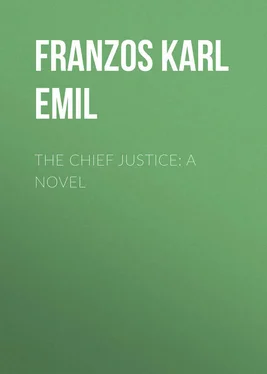Karl Franzos - The Chief Justice - A Novel
Здесь есть возможность читать онлайн «Karl Franzos - The Chief Justice - A Novel» — ознакомительный отрывок электронной книги совершенно бесплатно, а после прочтения отрывка купить полную версию. В некоторых случаях можно слушать аудио, скачать через торрент в формате fb2 и присутствует краткое содержание. Жанр: foreign_antique, foreign_prose, на английском языке. Описание произведения, (предисловие) а так же отзывы посетителей доступны на портале библиотеки ЛибКат.
- Название:The Chief Justice: A Novel
- Автор:
- Жанр:
- Год:неизвестен
- ISBN:нет данных
- Рейтинг книги:4 / 5. Голосов: 1
-
Избранное:Добавить в избранное
- Отзывы:
-
Ваша оценка:
- 80
- 1
- 2
- 3
- 4
- 5
The Chief Justice: A Novel: краткое содержание, описание и аннотация
Предлагаем к чтению аннотацию, описание, краткое содержание или предисловие (зависит от того, что написал сам автор книги «The Chief Justice: A Novel»). Если вы не нашли необходимую информацию о книге — напишите в комментариях, мы постараемся отыскать её.
The Chief Justice: A Novel — читать онлайн ознакомительный отрывок
Ниже представлен текст книги, разбитый по страницам. Система сохранения места последней прочитанной страницы, позволяет с удобством читать онлайн бесплатно книгу «The Chief Justice: A Novel», без необходимости каждый раз заново искать на чём Вы остановились. Поставьте закладку, и сможете в любой момент перейти на страницу, на которой закончили чтение.
Интервал:
Закладка:
"So I passed in this respect as an exemplary young man, too exemplary, some thought, and perhaps not without reason. But whoever had taken me at the time I entered upon my legal career, for an unfeeling calculator with a list of the competitors to be outstripped at all costs, in the place where other people carry a palpitating heart, would have done me a great injustice. I was ambitious, I strove for special promotion, not by shifts and wiles, but by special merit. And as to my heart, – oh! George, how soon I was to know what heart-ache was, and bliss and intoxication, and love and damnation!"
He rose, opened his writing-table, and felt for the secret drawer. But he did not open it; he shook his head and withdrew his hand. "It would be of no use," he murmured, and remained for awhile silently brooding.
"That was in the beginning of your career?" said Berger, to recall him.
"Yes," he answered. "It was more than twenty years ago, in the winter of 1832. I had just finished my year of probation at Lemburg under the eyes of the nearest and most affectionate of my relations, Count Warnberg, who was second in position among the judges there. He was an uncle, husband of my father's only sister. He had evinced the most cruel hardness to his brother-in-law, to me he became a second father. At his suggestion and in accordance with my own wish, I was promoted to be criminal Judge in the district of Suczawa. The post was considered one of the worst in the circuit, both my uncle and I thought it the best thing for me, because it was possible here within a very short time, to give conclusive proof of my ability. Such opportunities, however, were more abundant than the most zealous could desire: in those days there prevailed in the southern border-lands of the Bukowina, such a state of things as now exists only in the Balkan Provinces or in Albania. It was perhaps the most wretched post in the whole Empire, and in all other respects exceptionally difficult. The ancient town, once the capital of the Moldavian Princes, was at that time a mere confusion of crumbling ruins and poverty-stricken mud-cabins crowded with dirty, half-brutalized Roumanians, Jews and Armenians. Moreover my only colleague in the place was the civil judge, a ruined man, whom I had never seen sober. My only alternative therefore was either to live like an anchorite, or to go about among the aristocracy of the neighborhood.
"When I got to know these noble Boyars, the most educated of them ten times more ignorant, the most refined ten times more coarse, the most civilized ten times more unbridled than the most ignorant, the coarsest and the most unbridled squireen of the West, I had no difficulty in choosing: I buried myself in my books and papers. But man is a gregarious animal-and I was so young and spoiled, and so much in need of distraction from the comfortless impressions of the day, that I grew weary after a few weeks and began to accept invitations. The entertainments were always the same: first there was inordinate eating, then inordinate drinking, and then they played hazard till all hours. As I remained sober and never touched a card, I was soon voted a wearisome, insupportable bore. Even the ladies were of this opinion, for I neither made pretty speeches, nor would I understand the looks with which they sometimes favoured me. That I none the less received daily invitations was not to be wondered at; a real live Baron of the Empire was, whatever he might be, a rare ornament for their 'salons,' and to many of these worthy noblemen it seemed desirable in any case to be on a good footing with the Criminal Judge.
"One of them had particular reason for this, Alexander von Mirescul, a Roumanianised Greek; his property lay close to the Moldavian frontier and passed for the head-quarters of the trade in tobacco smuggling. He was not to be found out, and when I saw him for the first time, I realized that that would be a difficult business; the little man with his yellow, unctuous face seemed as if he consisted not of flesh and bone, but of condensed oil. It was in his voice and manner. He was manifestly much better educated and better mannered than the rest, as he was also much more cunning and contemptible. I did not get rid of this first impression for a long while, but at length he managed to get me into his house; I gradually became more favourable to him as he was, in one respect at least, an agreeable exception; he was a tolerably educated man, his daughters were being brought up by a German governess and he had a library of German books which he really read. I had such a longing for the atmosphere of an educated household that one evening I went to see him.
"This evening influenced years of my life, or rather, as I have learnt to-day, my whole life. I am no liar, George, and no fanciful dreamer, it is the literal truth: I loved this girl from the first instant that I beheld her."
Berger looked up in astonishment.
"From the first instant," Sendlingen repeated, and he struggled with all speed through his next words.
"I entered, Mirescul welcomed me: my eye swept over black and grey heads, over well-known, sharp-featured, olive-faces. Only one was unknown to me: the face of an exquisitely beautiful girl encircled by heavy, silver-blond, plaited hair. Her slender, supple figure was turned away from me, I could only see her profile; it was not quite regular, the forehead was too high, the chin too peculiarly prominent; I saw all that, and yet I seemed as if I had never seen a girl more beautiful and my heart began to beat passionately. I had to tear my looks away, and talk to the lady of the house, but then I stared again, as if possessed, at the beautiful, white unknown who stood shyly in a corner gazing out into the night. 'Our governess, Fräulein Lippert,' said Frau von Mirescul, quietly smiling as she followed the direction of my looks.
"'I know,' I answered nervously, almost impatiently; I had guessed that at once. Frau von Mirescul looked at me with astonishment, but I had risen and hurried over to the lonely girl: one of the most insolent of the company, the little bald Popowicz, had approached her. I was, afraid that he might wound her by some insulting speech. How should this poor, pale, timorous child defend herself alone against such a man? He had leant over her and was whispering something with his insolent smile, but the next instant he started back as if hurled against the wall by an invisible hand, and yet it was only a look of those gentle, veiled, grey eyes, now fixed in such a cold, hard stare that I trembled as they rested on me. But they remained fixed upon me and suddenly became again so pathetically anxious and helpless.
"At length I was beside her: I no longer required to defend her from the elderly scamp, he had disappeared. I could only offer her my hand and ask: 'Did that brute insult you?' But she took my hand and held it tight as if she must otherwise have fallen, her eyelids closed in an effort to keep back her tears. 'Thank you,' she stammered. 'You are a German, are you not Baron Sendlingen? I guessed as much when you came in! Oh if you knew!'
"But I do know all, I know what she suffers in this 'salon,' and now we begin to talk of our life among these people and our conversation flows on as if it had been interrupted yesterday. We hardly need words: I understand every sigh that comes from those small lips at other times so tightly closed, she, every glance that I cast upon the assembly. But my glances are only fugitive for I prefer looking straight into that beautiful face so sweetly and gently attractive, although the mouth and chin speak of such firm determination. She often changes colour, but it is more wonderful that I am at times suddenly crippled by the same embarrassment, while at the next moment I feel as if my heart has at length reached home after years and years, – perhaps a life-time's sojourn in a chill strange land.
Читать дальшеИнтервал:
Закладка:
Похожие книги на «The Chief Justice: A Novel»
Представляем Вашему вниманию похожие книги на «The Chief Justice: A Novel» списком для выбора. Мы отобрали схожую по названию и смыслу литературу в надежде предоставить читателям больше вариантов отыскать новые, интересные, ещё непрочитанные произведения.
Обсуждение, отзывы о книге «The Chief Justice: A Novel» и просто собственные мнения читателей. Оставьте ваши комментарии, напишите, что Вы думаете о произведении, его смысле или главных героях. Укажите что конкретно понравилось, а что нет, и почему Вы так считаете.












